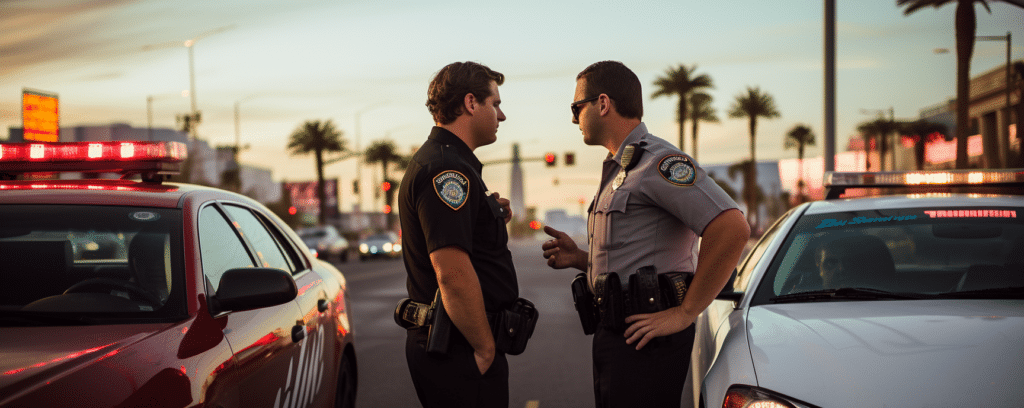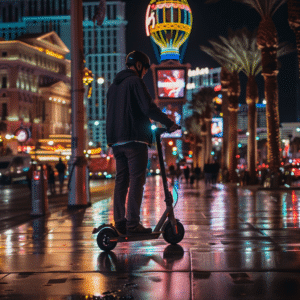
Wondering what happens if a scooter hits your car? We cut through the confusion, detailing immediate actions and guiding you through insurance and legal procedures without the jargon. Dive into this article to understand your next steps and how to handle the situation with confidence.
Key Takeaways
- Prioritize safety post-collision by moving to a safe area, checking for injuries, and contacting emergency services if necessary. Document the scene and obtain contact information from the scooter rider and witnesses.
- Understand your car insurance coverage as it may or may not cover damages caused by a scooter. Insurance claims can be influenced by the fault determination process and the specific terms of your policy.
- Evaluate and document property damage thoroughly with professional inspections and repair estimates. Determine liability for repair costs, considering scooter rider insurance, the current car value, and the possibility of your car being declared a total loss.
Contact us today and we will help you get the compensation that you deserve.
Assessing the Scene After a Scooter Collision or When a scooter hits your car
Right after a scooter collision, it’s pivotal to prioritize safety, document the scene, and comprehend your legal obligations. Given the emotional turmoil, a systematic approach can help maintain clarity, providing a short answer to what needs to be done immediately.
The scene of a scooter collision can be chaotic, with damaged vehicles, potential injuries like road rash, and the possibility of legal implications. The first moments after the collision are crucial, with safety being the foremost concern, followed by documenting the incident and understanding when to involve law enforcement.
Safety First: Ensuring Everyone is Unharmed
In the event of a collision, prioritizing everyone’s safety is paramount. Irrespective of the accident’s severity, here are the steps to follow:
- Relocate to a safe area off the road to avert additional risks and potential subsequent accidents.
- Assess the well-being of all individuals involved in the accident.
- Call for medical assistance if there are any injuries.
Bear in mind that some injuries may not manifest immediately. While scooter accidents can cause obvious common injuries such as broken bones or sprains, other serious injuries like traumatic brain injuries may not present symptoms until hours or even days after the accident. Therefore, regardless of the severity of the accident or the presence of a serious injury, seeking medical help is advisable.
Document the Incident: What to Record at the Scene
After confirming everyone’s safety, the subsequent action involves documenting the incident scene. This step is crucial for both insurance claims and potential legal proceedings. Taking photographs of the vehicles, accident location, and any injuries is a key part of this process. These visuals, along with your detailed account of the incident, will help insurance companies determine fault and coverage.
In addition to photos, witness statements can play a critical role in building a case. If possible, collect these statements at the scene, along with the contact information of those who provide them. Similarly, exchanging contact information with the scooter rider can facilitate compensation and protect against false accusations.
Legal Obligations: When to Involve Law Enforcement
In certain circumstances, reaching out to law enforcement following a scooter collision can be a vital move. If there are injuries or fatalities, or if a hit-and-run occurs, it’s mandatory to report the accident to law enforcement. The legal requirements for reporting an accident to the authorities can vary by region, but typically it must be done immediately or within a set timeframe after the incident occurs.
When the police are involved, they will file an official report which can be crucial for the insurance claims process and may assist in establishing fault. Therefore, even in smaller accidents, it could be beneficial to involve law enforcement to ensure all the necessary steps are taken.
Understanding Insurance Coverage for Scooter Accidents
Comprehending insurance coverage related to scooter accidents can sometimes feel like a complex maze. From comprehensive car insurance to the scooter rider’s liability, several types of insurance can come into play. Each type of insurance has its own set of rules, coverage limits, and exclusions, all of which can impact the outcome of your claim.
To add to the complexity, the fault determination in scooter accidents can be intricate, influencing how insurance companies approach property damage and liability claims. Considering these complexities, we’ll now examine the specifics of car insurance and scooter rider responsibilities.
Car Insurance: Does It Cover Scooter Damages?
In the event of a scooter collision, your car insurance can play a significant role in covering the damages. Comprehensive car insurance typically covers damages caused by non-collision events, including scooters hitting a stationary vehicle. Collision insurance, on the other hand, may provide coverage if your car is hit by a scooter while in motion.
When a scooter damages your car, you can file a claim with your insurance company. They may cover the costs, depending on the coverage terms of your policy and the circumstances of the incident. However, it’s important to note that insurance policies might cover the costs of damages after a scooter accident, minus any exclusions stated in the policy, such as for tires or depreciation.
Scooter Rider’s Responsibility: Insurance and Liability

- Personal liability
- Collision
- Comprehensive
- Uninsured motorist
- Medical payments
- Personal injury protection
However, automobile insurance typically excludes liability coverage for electric scooters and other vehicles, as they are not considered automobiles due to having fewer than four wheels.
These riders are also subject to regulatory frameworks in many urban areas, which require e scooter to conform to certain safety standards and insurance coverage requirements. Hence, grasping the rider’s insurance coverage and liability can be a significant factor following a scooter collision.
Evaluating Property Damage and Repair Costs When a Scooter hits Your car
Once everyone’s safety is confirmed and the insurance implications are understood, it’s time to assess the extent of property damage and associated repair costs. This includes visible aesthetic damage, such as dents and scratches, which can affect the car’s resale value, as well as potential structural damage, which may pose safety concerns.
To get a complete picture of the damage and the associated repair costs, a systematic process is needed. This involves having your car inspected by a professional, obtaining repair estimates, and finally, navigating who will cover these costs. We’ll now explore these steps in more detail.
Inspection and Estimates: The Path to Repairs When a scooter hits your car
The first step in assessing property damage is to have your car inspected by a professional mechanic. They can identify all damage, both visible and hidden, ensuring that your vehicle is fully restored to proper functioning. Following the inspection, an auto body shop will assess the damage to your vehicle and create an initial estimate, which will then be reviewed by your insurance company.
It’s recommended to obtain multiple repair estimates, as this can help establish a fair cost for restoring your damaged vehicle. These estimates should include replacement costs for parts that cannot be repaired, adding to the overall evaluation of property damage. Any differences in repair cost estimates from auto body shops and those of insurance companies are typically negotiated by the repair shop on behalf of the vehicle owner.
Navigating Repair Costs: Who Pays?
Upon completion of repair estimates, the query surfaces: who bears the cost? If the scooter operator is insured, their insurance may cover the repair costs, minus any deductible and depreciation. However, if the scooter operator is uninsured, they may agree to pay for the car damages directly.
Another factor to consider is the current market value of your car. If the cost of repairs exceeds this value, your car may be deemed a total loss, and the insurance company may opt to compensate you with the vehicle’s book value instead of paying for repairs. This can significantly affect the final compensation amount, so it’s critical to have a clear understanding of these factors:
- The current market value of your car
- The cost of repairs
- Whether your car will be considered a total loss
- The insurance company’s policy on compensation for total loss vehicles
By understanding these factors, you can better navigate the claims process and ensure you receive fair compensation for your car.
Legal Considerations in a Scooter-Vehicle Accident
In addition to insurance and repair costs, post-scooter collision scenarios warrant certain legal considerations. Determining who is at fault and therefore liable for the accident is a key part of this process. Additionally, understanding the legal principle of negligence and your rights to compensation can play a significant role in the aftermath of the collision.
While these legal aspects might be intricate and intimidating, they play a key role in achieving a just outcome for all parties involved. We’ll now explore the topics of liability and compensation further.
Determining Fault: Who is Liable?
In the context of scooter accidents, determining who is at fault is often not straightforward. Liability can involve multiple factors, including local traffic laws, the scooter rider’s behavior, and the actions of other involved parties. For example, a scooter rider may be considered liable if they disobey traffic signals or ride recklessly, leading to an accident.
However, in urban areas where scooter usage is prevalent, the complexity of these accidents can result in shared liability among various parties, such as scooter riders, pedestrians, and vehicle drivers. This is where the principle of comparative fault comes into play, requiring all parties in an accident to exercise care and abide by traffic laws, as their actions directly affect the outcome of any legal claims.
Negligence and Compensation: Your Rights
You may be eligible to recover compensation if you’ve been injured in a scooter crash due to another person’s negligence. This can help cover medical expenses and other costs associated with your injury. However, the amount of compensation you’re eligible to receive can be affected by the principle of comparative fault. This legal concept assesses the degree of fault of each party in an accident and can result in a reduction of compensation based on an individual’s share of fault.
Records of medical expenses and documentation from long-term care or therapeutic services are essential for accurately calculating losses and forming a reasonable demand for reimbursement. Additionally, keeping a personal journal can provide evidence of non-measurable damages like pain and suffering. A personal injury attorney can assist in organizing these records properly, providing guidance on how to handle the case efficiently.
Steps to Take Following the Accident
Once the immediate repercussions of the accident are handled, there are a few measures you ought to take to safeguard your interests. These include contacting your insurance company, keeping thorough records and receipts related to the accident, and consulting with an attorney. Following these steps can smooth the post-accident process, ensuring you’re prepared for any potential issues that may arise.
Each of these steps plays a pivotal role in effectively navigating the aftermath of a scooter collision. We’ll now examine each of these steps more thoroughly.
Contact Your Insurance Company
The first step after a scooter collision is to report the incident to your insurance company. Even if the damages seem minor, notifying your insurer is crucial. When reporting the accident, provide detailed incident information, such as the time and place of the accident, as well as the scooter’s information and the driver’s license number of the scooter rider.
Contacting your insurance company through the dealership where repairs are being handled can be an efficient way to file a claim. This not only streamlines the process but also ensures that your insurer has all the necessary information to assess your claim accurately.
Keep Records and Receipts
Keeping detailed records and receipts related to the accident is crucial in the aftermath of a scooter collision. These documents can include repair bills, medical receipts, and any related expenditure, all of which are essential for claiming insurance reimbursement. Maintaining these in chronological order can create a clear narrative for insurance adjusters, judges, or juries.
In instances where scooter riders are uninsured and agree to compensate for damages directly, meticulous records and receipts are essential for ensuring proper compensation. If the process seems overwhelming, a personal injury attorney can provide guidance and assist in organizing these records properly.
Consult with an Attorney

- Prompt advice
- Protection from pressuring tactics by insurers or at-fault parties
- Regular case updates
- Specific case information and legal assistance
- Guidance on how to handle your case efficiently
Remember, legal advice is not only for when disputes arise. Even in straightforward cases, consulting an attorney can provide you with peace of mind, ensuring that you are taking all the necessary steps and fully understanding your rights and obligations.
The Impact of Scooter Accidents on Drivers
Apart from the immediate consequences, scooter accidents can exert long-term effects on drivers. One of the most significant of these is increased insurance premiums, which can add a financial burden for years following the accident. Furthermore, sharing the road with scooters requires heightened vigilance and adaptation of driving behavior to mitigate the risks.
While these impacts may seem daunting, understanding them is the first step toward mitigation. We’ll now delve into these impacts and offer some pragmatic tips for drivers.
Increased Insurance Premiums: A Hidden Cost
One of the hidden costs of scooter accidents is the potential increase in car insurance premiums. If insurers deem drivers as high-risk due to their involvement in a scooter collision, premiums may rise. This increase typically occurs at the policy renewal period following the accident.
Unfortunately, even accident forgiveness policies may not protect drivers from a rate increase after multiple accidents. As a consequence of being involved in electric scooter accidents, there is a risk that insurance companies may either raise premiums or decide to drop coverage for the affected drivers.
Sharing the Road: Safety Tips for Drivers
With the increasing popularity of motorized scooters, drivers need to adapt their driving behavior to ensure safety for all road users. This includes staying alert, avoiding distractions, and maintaining safe following distances to minimize the risk of accidents with scooters.
At intersections and when making left turns, extra caution is needed, as scooters can be difficult to spot and their speed can be hard to gauge. At night, this vigilance should be increased, with greater following distances, appropriate use of low-beams, and giving extra space to scooters.
Frequently Asked Questions
What happens when you fall off a scooter?
If you fall off a scooter, it’s common to extend your arms or legs to brace the impact, which may prevent head and face injuries but could lead to fractures in the arms or legs. Fractures should be treated promptly to avoid complications.
How common are scooter accidents?
According to a study by EurekAlert and the CDC, electric scooter accidents have been on the rise with a 222% increase from 2014 to 2018. The injury rate is 20 out of every 100,000, with most injuries occurring during daytime hours.
What to do if a lime scooter hits your car?
If a Lime scooter hits your car, it’s important to report the accident to the police. This will help you in any potential legal proceedings that may result from the incident.
What should I do immediately after a scooter collision?
After a scooter collision, the first thing to do is ensure the safety of everyone involved and call for medical assistance if needed. Then, document the scene, take photos, collect witness statements, and report the accident to law enforcement if there are injuries, fatalities, or a hit-and-run situation.
Does my car insurance cover damages caused by a scooter?
Yes, comprehensive car insurance typically covers damages caused by a scooter, including a scooter hitting a stationary car, while collision insurance may provide coverage if your car is hit by a scooter while in motion.
Last updated Thursday, June 20th, 2024






